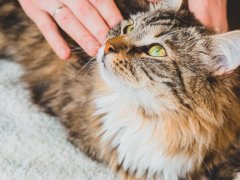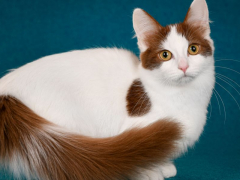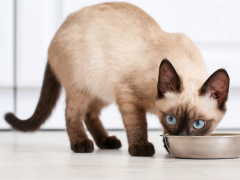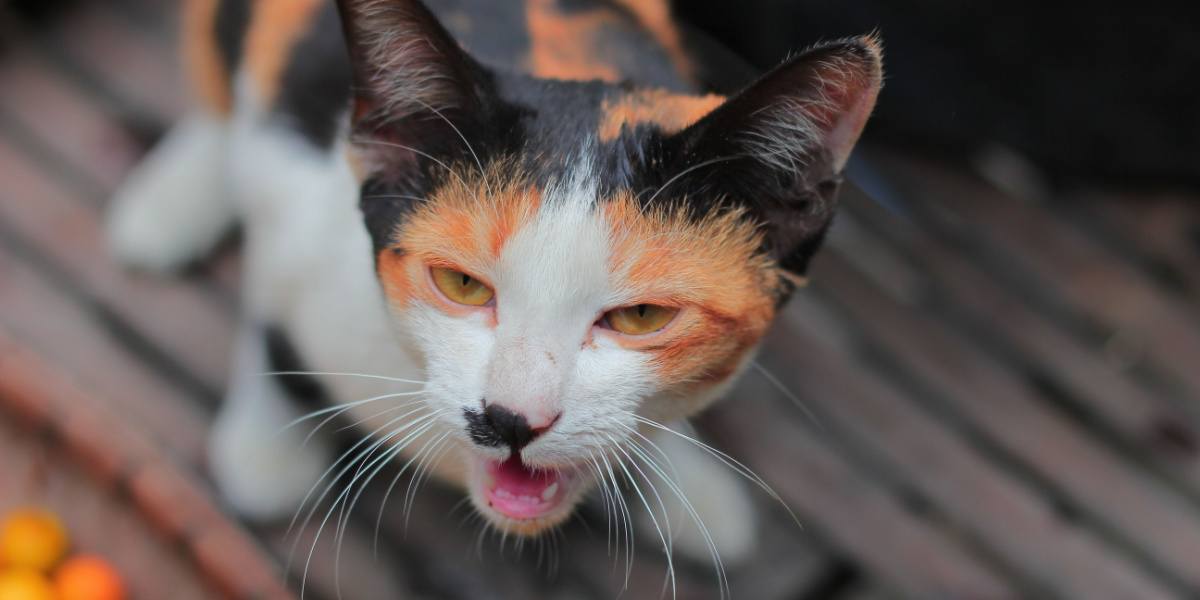
When you find yourself woken in the middle of the night by the sound of a gagging or vomiting cat, it can be difficult to think clearly. You may go stumbling through the house, looking for signs of vomit, and only find a puddle of clear foam where your cat has thrown up.
There are many potential reasons that cats may throw up foam and each of these conditions requires its own unique diagnostic workup and treatment.
Possible Causes of Cats Throwing Up Foam
One of the primary causes of throwing up in cats is any illness that affects the digestive tract. Cats can also vomit due to systemic diseases, or conditions that occur outside of the gastrointestinal tract such as diabetes, hyperthyroidism, chronic kidney disease, liver disease, and others. Toxin ingestion may also trigger vomiting, as well as some neurologic conditions.
When you think about “normal” cat vomit, you probably envision something that looks more or less like undigested food. This can make it surprising or concerning when your cat vomits frothy white foam or other clear liquid.
A cat will vomit foam when the stomach and upper intestines are empty. This foam is a combination of bile and mucus, which gives it a characteristic foamy appearance. The presence of foam in your cat’s vomit, instead of digested food, suggests that your cat probably did not eat in the hours immediately prior to vomiting.
Common causes of vomiting in cats include:
- Intestinal Parasites: There are a variety of intestinal worms that can cause vomiting in cats, including hookworms, roundworms, and Ollulanus tricuspis, the cat stomach worm. Cats typically develop these worms after coming in contact with the vomit or feces of an infected animal.
- Gastrointestinal upset: cats may have a mild tummy upset from eating something untoward, or other mild cause. This will usually resolve fairly quickly.
- Infection: Bacterial infections, such as Campylobacter and Salmonella, can cause vomiting in cats. There are also a number of viral illnesses that may cause vomiting in cats.
- Food Intolerance: Like humans, cats can develop allergies or sensitivities to ingredients in their food. While food allergies often cause skin issues in cats, some cats may develop vomiting or diarrhea as a result of a food sensitivity.
- Immune-mediated Disease: Cats are prone to a number of inflammatory conditions of the intestines, which are all commonly referred to as inflammatory bowel disease. The trigger of this inflammation is often unknown, although dietary sensitivity may play a role. Affected cats often demonstrate vomiting, diarrhea, and/or weight loss.
- Cancer: Tumors within the esophagus, stomach, or intestines can cause cats to throw up. These tumors may obstruct the mechanical flow of food past the tumor, or they may cause inflammation that interferes with normal gastrointestinal function.
- Foreign Body: Curious cats may eat something they shouldn’t – a foreign object. Once ingested, these materials can irritate the gastrointestinal tract or cause an intestinal blockage, either of which may trigger vomiting.
- Systemic Disease: In some cases, vomiting can be a symptom of a systemic (body-wide) disease. Conditions such as hyperthyroidism, diabetes, chronic kidney disease, and liver disease are all associated with vomiting, in addition to other illnesses
When to Call the Vet
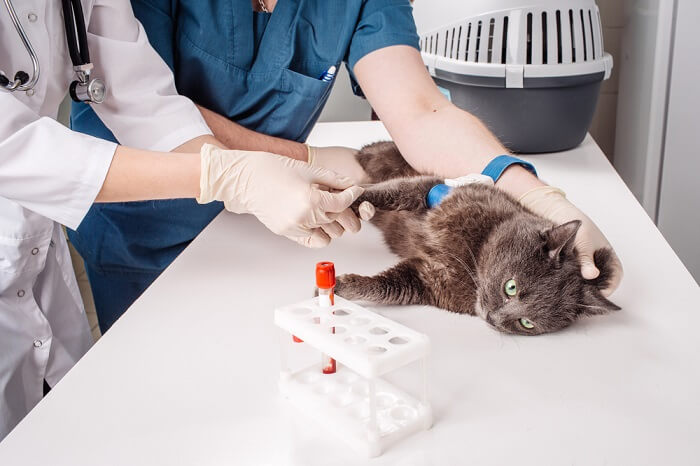
Cats may vomit foam for a wide variety of reasons, so if your cat is doing it regularly, you may want to talk to a veterinarian.
If you notice that your cat has thrown up foam, monitor them carefully. A single episode of vomiting (even if your cat vomits several puddles in rapid succession) may not require immediate intervention, as long as your cat is otherwise acting normally. Confine your cat to a small area for ease of monitoring (so you can be confident that your cat isn’t vomiting off in some corner of the house where you may not find it) and keep an eye on them, but they may return to normal over the next several hours.
If your cat has three or more episodes of vomiting in a day, however, or if they are acting very lethargic or ill even after a single episode of vomiting, you should contact your veterinarian to schedule an appointment for your cat. A loss of appetite that persists for more than one day should also trigger a call to your veterinarian.
It will be helpful to your veterinarian if you could make note of any characteristics of the vomit: timing after food, color, consistency and volume. The vet will also want to distinguish between acute and chronic vomiting. Acute vomiting is vomiting that has developed recently and suddenly.
What if my Cat Foaming at the Mouth but Acting Normal?
In order to determine the cause of your cat’s vomiting, so even if your cat is acting normal, your veterinarian will need to perform a thorough physical examination and diagnostic workup. During the physical exam, your veterinarian will palpate your cat’s abdomen, feeling for evidence of intestinal masses or intestinal thickening. They will also look for signs of systemic illness that may explain your cat’s vomiting.
Next, your veterinarian will recommend diagnostic testing. Depending on your cat’s age, history, and physical exam abnormalities, recommended tests may include bloodwork, a urinalysis, testing for feline leukemia and feline immunodeficiency virus, thyroid level testing (in older cats), abdominal radiographs (x-rays), and/or abdominal ultrasound. Additional testing may also be recommended, depending on the results of these initial tests.
Treating a Cat Vomiting Foam
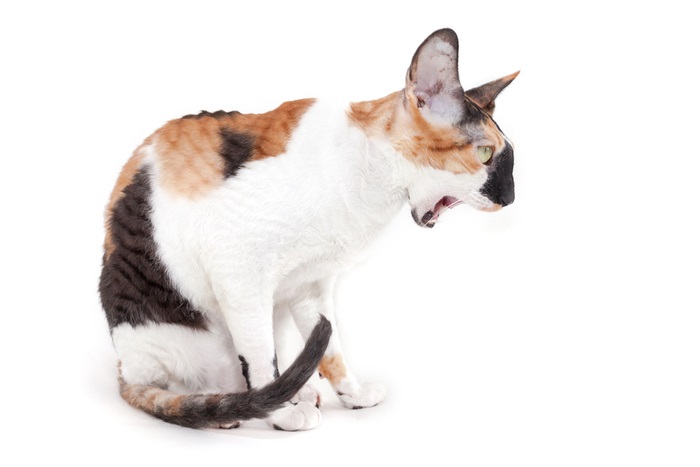
Your vet will recommend treatment options dependent on their examination and diagnostic findings.
Treatment for a cat throwing up foam will depend on what the veterinarian finds on their examination and other tests. Always follow your vet’s recommendations for your pet.
Common treatments may include anti-nausea injections, anti-inflammatories, antibiotics and/or worming treatments. Your vet may recommend a specific diet, especially if food sensitivities are suspected.
More serious gastrointestinal causes, such as tumors, obstructions and foreign bodies may require surgery or more intensive treatment. Other systemic diseases, such as hyperthyroidism, will require specific therapies.
Prevention of Cat Throwing Up Foam
There are no specific ways to prevent cats vomiting, but here are some general care tips to keep your cat’s digestive system healthy and happy.
- Feed a suitable amount of a good quality cat food, suitable for your pet’s age and lifestyle
- A source (or more!) of clean, fresh water should always be available
- Keep your cat up to date with worming treatments, and any recommended vaccinations
There are a number of reasons that your cat may vomit foam, on either an acute or chronic basis. If you have concerns about your cat’s vomiting, it’s always best to contact your veterinarian for a thorough evaluation.


